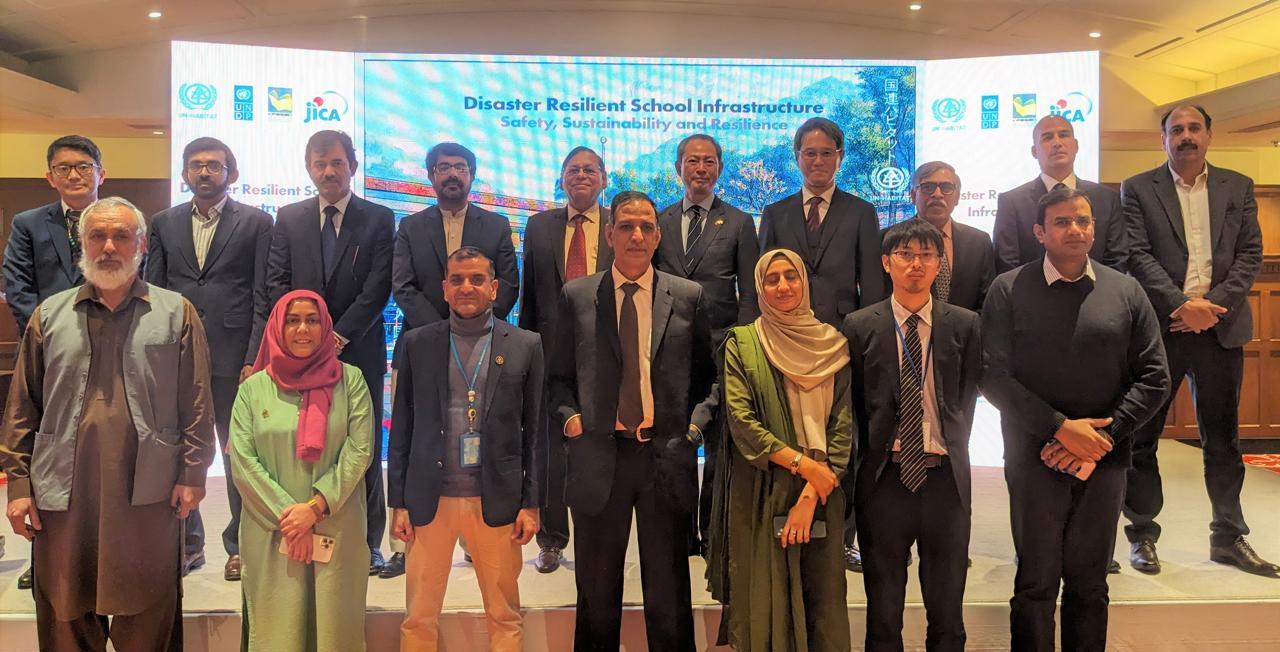
150 KP Schools Made Safer For 31,000 Students As UN-Habitat, JICA Complete Disaster-Resilience Project
UN-Habitat convened a high-level gathering to showcase progress made under the Disaster Resilient School Infrastructure (DRSI) Project, marking a significant step toward creating safer and more resilient learning environments in Pakistan's disaster-prone regions.
The event highlighted the achievements of the initiative, which has played a vital role in reinforcing school safety across Khyber Pakhtunkhwa (KP), one of the country's most affected provinces.
KP has repeatedly suffered from earthquakes, floods, and climate-induced disasters that have damaged school buildings, many of which were constructed before the adoption of Pakistan's 2007 Building Code and lacked seismic resilience.
In response, UN-Habitat launched the DRSI Project to strengthen the structural safety of vulnerable schools through retrofitting, repair work, and the upgrading of essential facilities.
Funded by 471 million Japanese Yen from the Government of Japan and the Japan International Cooperation Agency (JICA), the project was jointly implemented by UN-Habitat and UNDP in close coordination with the Elementary and Secondary Education Department of KP.
Also Read: CM Sohail Afridi Stages Sit-In Outside Adiala Jail After Being Denied Meeting With Party LeaderThrough this initiative, 150 schools across eight districts-including Buner, Swat, Malakand, Peshawar, Upper and Lower Chitral, and Upper and Lower Dir-were strengthened. The project improved the learning environment for 31,000 students, including 13,595 girls, and rehabilitated 300 gender-responsive WASH facilities, including those in 66 girls' schools.
Speaking at the gathering, UN-Habitat Senior Advisor and Programme Manager Mr. Jawed Ali Khan emphasized the organization's leadership in promoting safer school environments. He noted that the retrofitted schools now offer structurally stable classrooms, improved ventilation and lighting, and essential WASH services-ensuring that children can learn with confidence and security.
JICA's Chief Representative, Mr. Naoaki Miyata, said the project would significantly enhance the resilience of primary, middle, and high school buildings in disaster-prone areas of KP, particularly across the eight selected districts. He reaffirmed Japan's continued commitment to supporting Pakistan in strengthening disaster resilience.
The Ambassador of Japan to Pakistan, H.E. Mr. Akamatsu Shuichi, commended the collaborative effort behind the project and emphasized that reinforcing school infrastructure is a critical investment in protecting children and ensuring continuity of education during natural disasters.
UN-Habitat Deputy Programme Manager Mr. Hamid Mumtaz underscored the urgent need to bolster resilience in schools across high-risk regions. Drawing on two decades of experience in Pakistan, he noted that UN-Habitat has contributed significantly to disaster risk reduction, safer reconstruction, national guidelines for earthquake- and flood-resistant structures, and multi-hazard risk assessments-efforts that together support safer learning environments across KP.
The Secretary of the Elementary and Secondary Education Department, Government of KP, expressed gratitude for the support extended by Japan, JICA, UN-Habitat, and UNDP. He said the project had greatly improved school safety in districts previously devastated by earthquakes and floods, adding that strengthened facilities have boosted community trust and encouraged better student attendance. He emphasized the importance of continued collaboration to ensure long-term resilience in the education sector.
The National Disaster Management Authority (NDMA) also acknowledged the project as a valuable contribution to national disaster preparedness, noting that resilient school infrastructure is key to saving lives, reducing long-term losses, and ensuring uninterrupted learning for children living in high-risk areas.
The DRSI Project demonstrates the transformative impact of targeted investments in structural safety, WASH services, and resilience-building interventions. While the project has strengthened safety across 150 schools, officials stressed that the needs in Khyber Pakhtunkhwa remain far greater than existing resources. Continued investment is essential to safeguard children, enhance school resilience, and advance Sustainable Development Goal 4, which calls for safe, inclusive, and quality education for all.

Legal Disclaimer:
MENAFN provides the
information “as is” without warranty of any kind. We do not accept
any responsibility or liability for the accuracy, content, images,
videos, licenses, completeness, legality, or reliability of the information
contained in this article. If you have any complaints or copyright
issues related to this article, kindly contact the provider above.

















Comments
No comment